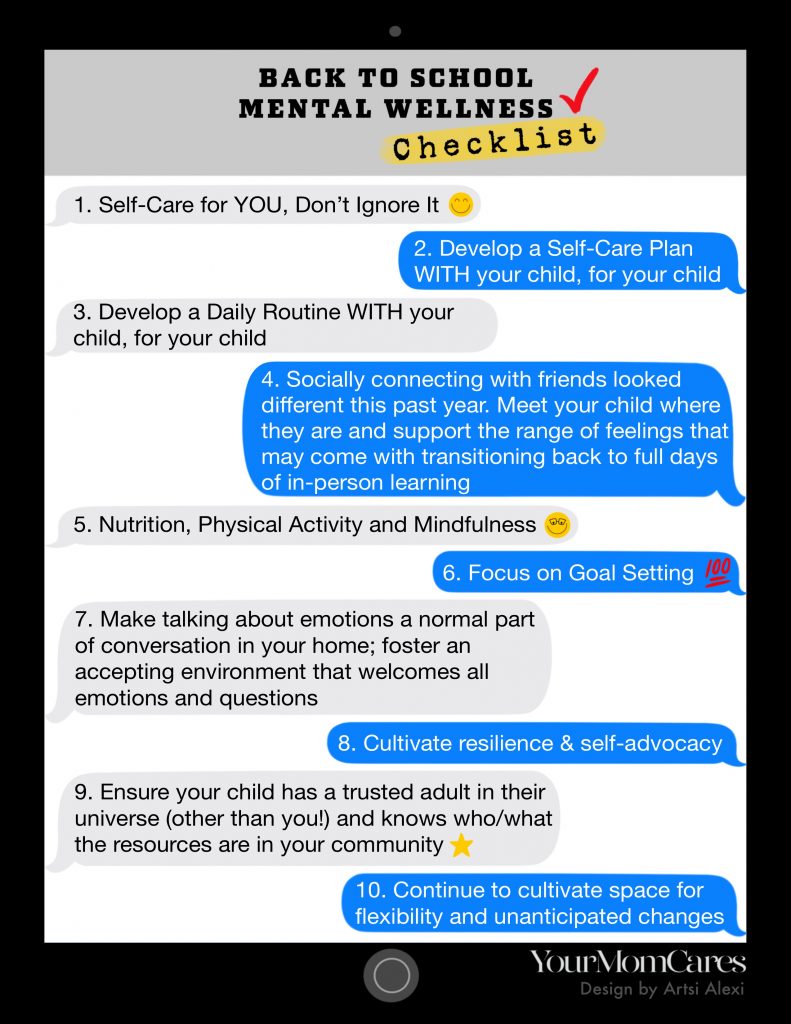We are thrilled to share the new Mental Health Checklist from our friends at YourMomCares. Just in time for the school year, this wonderful organization has provided ways to help our kids have a happier, healthier year.
According to the American Academy of Pediatrics, the pandemic has impacted the mental health of kids in a variety of ways, including isolation, losing a loved one or financial hardships. So in addition to sharing this checklist, we asked Dr. Michelle Chung, a clinical psychologist who is an Expert Mom for YourMomCares, about how we can best help our kids.
To read our interview with YourMomCares Founder, Sharon Feldstein (mom to actor Jonah Hill and actress Beanie Feldstein) click here.
How are you involved in YourMomCares and why did you become involved?
I am an “Expert Mom” (that’s what YourMomCares calls me) specializing in children’s mental health. YourMomCares is an amazing organization with great and genuine people behind it. They actually get things done and really care about breaking the stigma and making mental health accessible to all children. Who wouldn’t want to get involved?!
What is the biggest misconception about mental health in kids and adolescents?
I have come across 3 widely believed misconceptions:
- It is just a phase; my child will grow out of it. (While this may be true in some cases, an evaluation never hurt anyone.)
- When I was younger, I went through the same thing so it must be okay. (Yes, you survived, but is that the goal for our kids or is it to help them thrive. Providing support can help your child learn ways to deal with their “stuff” in a more effective way, an opportunity you may not have been given at their age.)
- If I speak to my child about [insert sensitive topic], it will plant a seed or expose them to ideas they didn’t have before. (I can understand where this belief and worry comes from. We need to use our good judgement about developmentally appropriate topics. However, research has shown that speaking to your children about sensitive topics, such as suicidal thoughts, does not increase the likelihood for it to occur. In fact, not speaking to them about these topics can be more damaging since they will be left to their peers and the internet to teach them.)
How has social media contributed to deteriorating mental health in this population?
As with most things in life, social media has benefits and pitfalls.
It can help children/teenagers feel connected with one another and grow awareness of good causes. The downsides of social media have more to do with social comparisons and a new type of peer pressure. Instead of living in the moment and feeling gratitude for what they have, kids are exposed to everyone’s best moments captured in a photo or video. They can feel left out and as if their life is lacking. I tell the kids I work with that “their beauty is NOT your lack”. Sometimes, the kids are exposed to online bullying, which can be more covert and mean than in person. Before social media, the home could be an escape from that bully at school, but now it follows you wherever you go. There is also a lot of research focused on what it does to the developing brain and dopamine levels, creating a type of addiction or chase for instant gratification. All these factors affect mood, anxiety, and self-esteem.
The pandemic has contributed to an increase in depression, anxiety, and even suicide. Can you talk about these stats?
According to the CDC, there was a 39.1% increase in ER trips for potential suicides by children aged 12 to 17 in the winter of 2020 compared to the winter of 2019. Alarmingly, visits increased by 50.6% for girls in this age range during the month of February to March of this year, when compared to the same period in 2019. It is hard to draw definitive conclusions from these statistics, as we are still living through the pandemic and researchers are still gathering information. Some people have proposed that the focus on mental health could have prompted parents to get their children help. Also, with parents spending more time at home, they may notice their children struggling and take them to the ER. Either way you look at it, the decline in mental health has been exacerbated by the pandemic.
Why has the pandemic been so incredibly destructive to young people’s mental health?
The short answer: the new measures to keep us safe during the pandemic (social distancing, closing schools, staying indoors, etc.) put kids at higher risk to adverse effects. Childhood is a period when you are still figuring things out and moods fluctuate. On top of that, the pandemic added another layer of stress. Losing connection with peers and social isolation is a big factor. This is especially true for teens, when developmentally they are supposed to be around peers. The loss of structure left kids floating and bored. Not only were there new barriers to support systems and people, the other adults in their lives that usually provide additional support or a “watchful eye” were no longer in the picture. The access to their usual coping mechanisms were blocked. Many kids I work with use sports or exercise to destress. Things that build resilience and bring joy were limited. In fact, many kids were mourning the loss of celebrations and milestones such as proms and dances. There were new stressors at home and uncertainties. Anxieties about health, financial stability, stressed parents, relationship conflicts, and for some kids their home environments were toxic. In turn, substance use increased and reliance on digital devices skyrocketed. This opened up other vulnerabilities.
What are some signs your child is struggling?
The best thing that parents can do is to create natural check-in points and spend time with their kids, to listen in a non-judgmental and curious way. Parents can validate all feelings and perspectives, both good and bad. Doing this will encourage more honest and open conversations. This can happen during a meal or during wind-down time before bed.
Here are some things to look out for:
- Rapid changes in behaviors or mood
- Irritable
- Crying, sad
- Sleeping more or less, hard time falling or staying asleep
- Decline in grades
- Not wanting to do things they like to do before, loss of interest
- Wanting to stay in the room a lot
- Tantrums
- Stomach issues or somatic complaints
- Hopelessness
- Irrational Anger
- Increased conflicts with friends or family
- Withdrawing from friends, less chatting, video gaming
- Changes in appetite or weight
- Changes in concentration, memory, focus
- Lack of interest in hygiene
- Drugs and alcohol use
- Fatigue or lack of energy
If there seems to be something off, how can parents help?
Talk to your kid. Always start off asking them about their experience and be a good listener. Help them label their feelings and put words to their experience, if they need the support. Explain how anxiety or depression may look in real life. Explain to your child why you are concerned (What are you noticing in them?). Share your own similar struggles, within reason, to debunk stigma and normalize it. Go over options for treatment. Encourage your kid to be open to next steps and offer them hope. Help identify and encourage supportive relationships.
If your child agrees to seek help, your pediatrician should have referrals. You can ask for a child therapist or if you think medication can help ask for a psychiatrist. You can also ask the school counselor or call a service like LIFENET 1-800-LIFENET (800-543-3638) for referrals.
What can parents do proactively to prevent any issues?
Allow yourself to be available for your kids. Spend time with them and build a strong relationship. This will help your child be more open and honest with you when they need help. Tell your child that they can come to you with anything. When they do, react/respond in a calm and composed manner.
Model self-care as an example for your child. Invite them into your self-care routines, such as jogging, cooking, or yoga. This is a great way to learn what works for them as well.
Model vulnerability and fallibility. Equally as important is modeling resilience and getting back up again. It is all about the bounce back!
Help build resilience in your child. Have fun with them! Building joyful memories is a great way to build up reserves for when things get rough.
Get your child support and help earlier rather than later. If you see that your child is struggling with anxiety or sad mood, seek support. If your child refuses to speak with a professional, you can consult with one as the parent to learn ways to support your child.
If you or someone you know are in a crisis or feel suicidal, call the National Suicide Prevention Lifeline at 800-273-8255, text HOME to 741741 or visit SpeakingOfSuicide.com/resources for other resources.
Meet the Expert
Dr. Michelle Chung is a clinical psychologist based in New York City specializing in the treatment of anxiety-related, mood, and ADHD / executive functioning challenges.
She works with youth, families, and adults in her boutique private practice. Dr. Chung has published in the areas of child trauma, suicide, and has given presentations on how to engage and support caregivers throughout treatment. Additionally, Dr. Chung serves on the faculty of Mt. Sinai Medical Center and is the co-founder of Rock The Mindset (@rock.the.mindset), an online platform of courses and live workshops about mental health and emotional well-being. She is proud to be an Expert Mom for YourMomCares.


